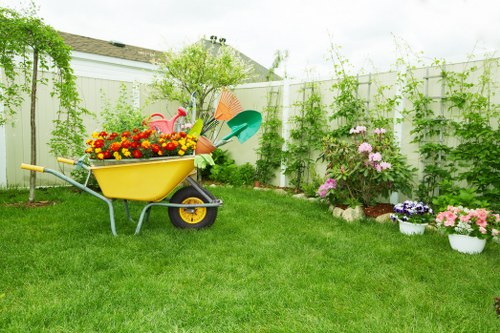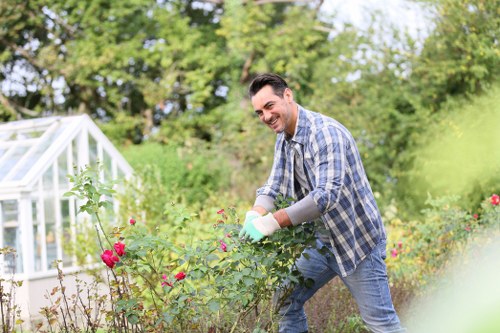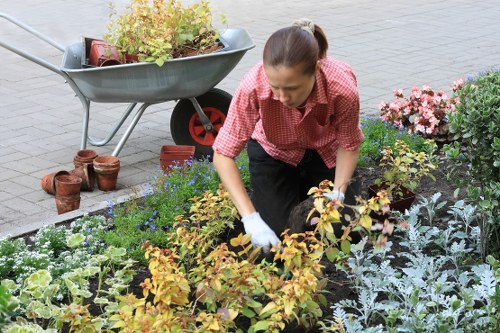Effective Driveway Algae Removal in Seven Sisters

Maintaining a clean and safe driveway is essential for every homeowner. In Seven Sisters, the damp climate can lead to the growth of algae on driveways, making them slippery and unsightly. Algae thrives in moist environments, and the presence of moss and mold can further damage your driveway's surface. Understanding how to effectively remove algae ensures the longevity and appearance of your driveway.
Algae removal is not just about aesthetics; it also plays a significant role in preventing accidents. Wet and slippery driveways can be hazardous, especially during the rainy season. By addressing algae growth promptly, homeowners can ensure a safer environment for their families and visitors.
There are various methods available for algae removal, each with its own set of advantages. From traditional scraping techniques to modern chemical treatments, choosing the right approach depends on the severity of the problem and the type of driveway surface you have.

Understanding Algae Growth on Driveways
Algae is a simple plant that thrives in moist, shaded areas. Driveways in Seven Sisters often provide the perfect conditions for algae to flourish due to the region's climate. The presence of shade from surrounding trees and buildings, combined with frequent rainfall, creates an ideal environment for algae to grow.
Algae can appear as green, black, or even reddish patches on your driveway. While green algae is the most common, discoloration can occur depending on the type of algae and the materials used in your driveway's construction. It's important to identify the type of algae to choose the most effective removal method.
Ignoring algae growth can lead to more severe issues. Over time, algae can degrade the surface of your driveway, causing cracks and other structural damages. Regular maintenance and prompt removal are crucial to preserving the integrity of your driveway.

Top Methods for Algae Removal
1. Pressure Washing
Pressure washing is one of the most effective ways to remove algae from driveways. Using high-pressure water jets, this method can quickly eliminate algae, moss, and mold. It's suitable for various driveway materials, including concrete, asphalt, and pavers.
2. Chemical Treatments
Chemical algae removers are widely available and can be particularly effective for stubborn growth. These treatments typically contain bleach or other strong agents that kill algae and prevent future growth. It's important to follow the manufacturer's instructions to ensure safety and effectiveness.
3. Natural Remedies
For those who prefer eco-friendly solutions, natural remedies like vinegar, baking soda, and hydrogen peroxide can be used to remove algae. These substances are less harsh on the environment and can be effective when applied correctly.
4. Scrubbing and Manual Removal
In cases of light algae growth, manual scrubbing with a stiff brush and a suitable cleaning solution can suffice. This method requires more effort but allows for precise removal of algae without the use of chemicals.

Preventing Future Algae Growth
Once you've successfully removed algae from your driveway, taking preventive measures is essential to keep it from returning. Here are some strategies to prevent future algae growth:
- Ensure proper drainage to reduce moisture buildup.
- Trim surrounding vegetation to increase sunlight exposure.
- Apply a sealant to your driveway to create a barrier against moisture.
- Regularly clean your driveway to remove debris and prevent algae from establishing.
By implementing these preventive measures, you can maintain a clean and safe driveway, minimizing the need for frequent algae removal.

Choosing the Right Professional in Seven Sisters
If the algae problem is extensive, hiring a professional driveway cleaning service in Seven Sisters might be the best solution. Professionals have the expertise and equipment necessary to handle severe algae growth effectively.
When selecting a service provider, consider the following:
- Experience and reputation in algae removal.
- Use of eco-friendly and safe cleaning products.
- Transparent pricing and detailed service offerings.
- Customer reviews and testimonials.
Investing in a reputable professional service ensures that your driveway is cleaned thoroughly and treated to prevent future algae growth, providing long-term benefits.
Local Relevance: Surrounding Areas Near Seven Sisters
Seven Sisters is surrounded by several charming areas, each with its unique characteristics relevant to driveway algae removal:
- Holloway: Known for its vibrant community, Holloway experiences similar climate conditions, making algae removal a common concern.
- Crouch End: With lush greenery, managing moisture levels is essential to prevent algae growth on driveways.
- Upper Holloway: The area’s dense tree cover provides ample shade, creating an ideal environment for algae.
- Highgate: Highgate residents often seek professional algae removal services due to the steep driveways and complex surfaces.
- Archway: Archway’s mixture of residential and commercial properties requires tailored algae removal solutions.
- Tucson: Not to be confused with the city in Arizona, Tucson near Seven Sisters shares similar maintenance challenges.
- Finsbury Park: The proximity to large parks means driveways are frequently exposed to organic debris that can promote algae growth.
- Palmers Green: Homeowners here prioritize eco-friendly algae removal methods to align with the area's green initiatives.
- East Finchley: The historical architecture in East Finchley requires careful algae removal to preserve surface integrity.
- Tottenham: Tottenham’s busy streets and communal spaces increase the necessity for regular driveway maintenance.
Conclusion
Driveway algae removal in Seven Sisters is a manageable task with the right knowledge and tools. Whether opting for DIY methods or hiring professionals, maintaining a clean driveway enhances both the safety and curb appeal of your property. By understanding the causes of algae growth and implementing effective removal strategies, homeowners can enjoy a pristine driveway year-round.
Regular maintenance and preventive measures are key to avoiding recurring algae issues. Embrace the solutions discussed to keep your driveway looking its best and to ensure a safe environment for all who use it.
Frequently Asked Questions
1. What is the best time of year to remove algae from my driveway?
The best time to remove algae is during the warmer, sunnier months when you can also take preventive measures to reduce future growth.
2. Can I use household bleach to remove algae?
Yes, household bleach can be effective. However, ensure you dilute it properly and rinse thoroughly to prevent damage to surrounding plants and surfaces.
3. How often should I clean my driveway to prevent algae?
Regular cleaning every 3-6 months, especially during wet seasons, can help prevent algae from establishing itself.
4. Are there eco-friendly solutions for algae removal?
Yes, natural remedies like vinegar, baking soda, and hydrogen peroxide are eco-friendly alternatives to chemical treatments.
5. Should I seal my driveway after removing algae?
Sealing your driveway can provide an extra layer of protection against moisture and algae growth, extending the time between cleanings.


